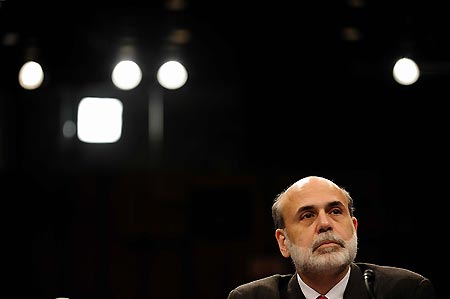U.S. Federal Reserve Chairman Ben Bernanke told Congress Tuesday that the economy will begin to rebound later this year but the recovery will probably be slower than usual.
 |
|
U.S. Federal Reserve Chairman Ben Bernanke testifies before the Joint Economy Committee on the Fed's measures to free the bank lending and stimulate the economy in Washington, capital of the United States, May 5, 2009. Bernanke told the Congress that the economy should walk out of a recession and start growing again later this year on Tuesday.[Xinhua] |
"We continue to expect economic activity to bottom out, then to turn up later this year," said Bernanke in prepared testimony to the Congress' Joint Economic Committee.
He noted that the housing market is beginning to stabilize and that the sharp inventory liquidation that has been in progress will slow over the next few quarters.
"Final demand should also be supported by fiscal and monetary stimulus," said Bernanke.
"An important caveat is that our forecast assumes continuing gradual repair of the financial system; a relapse in financial conditions would be a significant drag on economic activity and could cause the incipient recovery to stall," he added.
But the Federal Reserve chief also warned that even after a recovery gets under way, the rate of growth of real economic activity is likely to remain below its longer-run potential for a while.
"We expect that the recovery will only gradually gain momentum and that economic slack will diminish slowly," he said, "In particular, businesses are likely to be cautious about hiring, implying that the unemployment rate could remain high for a time, even after economic growth resumes."
The U.S. economy shrank at an annual rate of 6.1 percent in the first quarter of 2009, slightly smaller than the 6.3 percent drop in the previous quarter.
The worse-than-expected decline marked the third straight quarter of contraction for the world's biggest economy and signaled little improvement in a deep recession.
Many analysts were predicting the U.S. economy would shrink less in the current April-June period as the government's stimulus begins to take hold.
(Xinhua News Agency May 6, 2009)